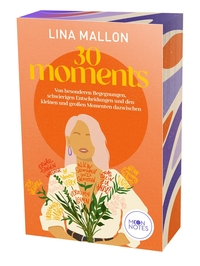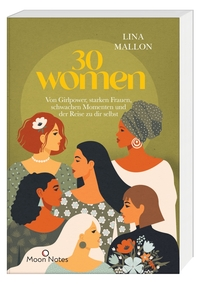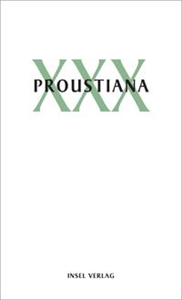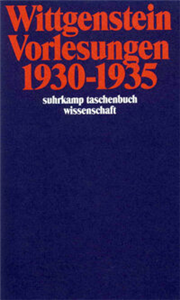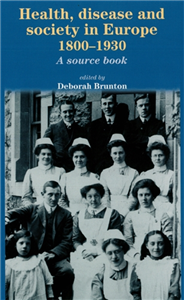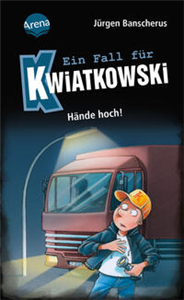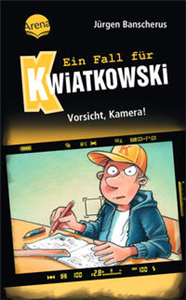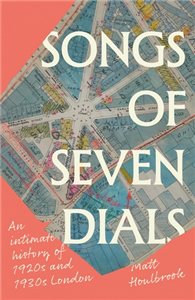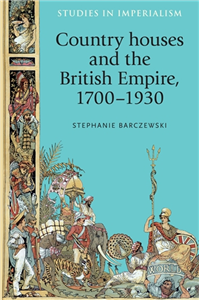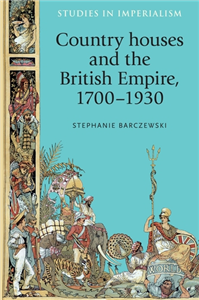Your Search Results
-
Promoted Content
-
Promoted ContentMarch 2024
30 Moments
Von besonderen Begegnungen, schwierigen Entscheidungen und den kleinen und großen Momenten dazwischen
by Lina Mallon, Moon Notes
Mit schönem Farbschnitt in der Erstauflage – Lieferung je nach Verfügbarkeit Vom Lieben, vom Scheitern und vom echten Leben: Influencerin Lina Mallon hautnah. Welche Entscheidungen sind richtungsweisend für unser Leben? Welche Begegnungen ändern unsere Art zu denken? Und was lässt uns eigentlich zu dem Menschen werden, der wir sind? All diesen Fragen geht Lina Mallon auf den Grund und gewährt uns dabei tiefe Einblicke in ihr Innerstes. Ihre Fortsetzung von „30 Women“, dem Buch über ihre Freundinnen und die Frauen, die ihr Leben geprägt haben, erzählt von der Liebe, von Fehlschlägen, von den vielen kleinen und den so besonderen, großen Momenten, die eine Reise zu sich selbst bereithalten kann. Erlebe Lina Mallon, die erfolgreiche Influencerin aus nächster Nähe und lerne eine sehr persönliche und intime Seite von ihr kennen. „30 Moments“ haben Content Creator und Freigeist Lina Mallon zu dem gemacht, was sie heute ist: erfolgreich und glücklich. Fotografin, Lifestyle Bloggerin und Influencerin Lina Mallon schreibt offen über die wichtigste Beziehung, die jeder Mensch in seinem Leben führt, die zu sich selbst. Wie kannst du zu dem Menschen werden, der du sein möchtest? Die junge Autorin versteht es, die Themen Selbstfindung und Achtsamkeit mit echtem Leben zu füllen. Empowernde Fortsetzung von „30 Women“, die jede und jeden auf der Reise zu sich selbst mit klugen Fragen und sehr persönlichen Antworten begleitet. Lass dich von einer starken Frau der Gen Y inspirieren, deinen eigenen Weg zu finden. Zigtausende Follower*innen auf Insta tun es bereits. Genial ausgestattet in der Erstauflage: Softcover mit Klappen, trendig illustriertem Buchschnitt und coolem Lesezeichen zum Abtrennen.
-
 Trusted Partner
May 2022
Trusted Partner
May 202230 Women
Von Girlpower, starken Frauen, schwachen Momenten und der Reise zu dir selbst
by Lina Mallon, Moon Notes
In "30 Women" öffnet die Autorin Lina Mallon persönlich und authentisch ihre Gedanken- und Gefühlswelt und teilt die Geschichten von dreißig Frauen, die in verschiedenster Weise ihr Leben beeinflusst und geprägt haben. Diese Frauen – von engen Freundinnen über familiäre Bezugspersonen bis hin zu beruflichen Vorbildern und inspirierenden öffentlichen Persönlichkeiten – repräsentieren eine Bandbreite an Erfahrungen, Lehren und Perspektiven, die Mallon auf ihrem eigenen Lebensweg begleitet haben. Indem sie ihre eigenen Erlebnisse, Auseinandersetzungen und Entwicklungen im Kontext dieser Begegnungen reflektiert, bietet sie Einblicke in die vielschichtigen Facetten weiblicher Beziehungen, gegenseitiger Unterstützung und persönlicher Wachstumsprozesse. Mallon betont die Bedeutung von authentischer Verbindung, offener Kommunikation und der Fähigkeit, sowohl Unterstützung zu geben als auch anzunehmen. Sie thematisiert die Herausforderungen und Widersprüche, mit denen Frauen in einer von gesellschaftlichen Erwartungen und individuellen Träumen geprägten Welt konfrontiert sind. "30 Women" ist nicht nur eine Hommage an die Kraft und Diversität weiblicher Beziehungen, sondern auch ein Plädoyer für mehr Solidarität, Empathie und Selbstbestimmung unter Frauen. Es ist eine Ermutigung, sich gegenseitig zu fördern, ehrlich miteinander umzugehen und gemeinsam sowohl die Freuden als auch die Herausforderungen des Lebens zu meistern. Inspirierende Geschichten von 30 Frauen, die das Leben von Bestsellerautorin Lina Mallon geprägt haben. Authentische Einblicke in Freundschaften, gesellschaftliche Erwartungen und die persönliche Entwicklung einer Frau. Faszinierende Auseinandersetzung mit der Kraft der weiblichen Solidarität und der Bedeutung von echtem Support. Persönliche und offene Reflexionen über Enttäuschungen in Freundschaften und den Umgang mit Kritik. Ermutigung für Frauen, sich gegenseitig zu unterstützen und gemeinsam zu wachsen, statt sich als Konkurrentinnen zu sehen. Lebensnaher Ratgeber, der die Leserinnen dazu anregt, über ihre eigenen Beziehungen und Erfahrungen nachzudenken. Abwechslungsreiche Porträts von Frauen aus unterschiedlichen Lebensbereichen, die alle auf ihre Weise inspirieren. Ein Buch von der bekannten Bloggerin, Fotografin und Podcasterin Lina Mallon, die ihre persönlichen Erfahrungen und Erkenntnisse teilt. Ein Aufruf zu mehr Ehrlichkeit, Selbstreflexion und Mut in der Gestaltung weiblicher Beziehungen. Perfekt für Leserinnen, die sich für Themen rund um Freundschaft, Frauenpower und persönliches Wachstum interessieren.
-
 Trusted Partner
November 2017
Trusted Partner
November 2017Proustiana XXX
Mitteilungen der Marcel Proust Gesellschaft
by Marcel Proust Gesellschaft
Die Proustiana, offizielles Mitteilungsorgan der Marcel Proust Gesellschaft, dokumentieren aktuelle Zeugnisse der deutschsprachigen Proust-Rezeption und enthalten Buchbesprechungen sowie Hinweise auf Aktivitäten »autour de Proust«. In diesem Band findet sich außerdem ein Autoren- und ein Titelregister sämtlicher Beiträger und Beiträge, die in den verschiedenen Publikationen der Marcel Proust Gesellschaft seit ihrer Gründung vor 35 Jahren veröffentlicht wurden. Im Anhang das Verzeichnis der ca. 500 Mitglieder.
-
 Trusted Partner
July 2000
Trusted Partner
July 2000Werke. Große kommentierte Berliner und Frankfurter Ausgabe. 30 Bände (in 32 Teilbänden) und ein Registerband
by Bertolt Brecht, Werner Hecht, Jan Knopf, Klaus-Detlef Müller
Bertolt Brecht wurde am 10. Februar 1898 in Augsburg geboren und starb am 14. August 1956 in Berlin. Von 1917 bis 1918 studierte er an der Ludwig-Maximilians-Universität München Naturwissenschaften, Medizin und Literatur. Sein Studium musste er allerdings bereits im Jahr 1918 unterbrechen, da er in einem Augsburger Lazarett als Sanitätssoldat eingesetzt wurde. Bereits während seines Studiums begann Brecht Theaterstücke zu schreiben. Ab 1922 arbeitete er als Dramaturg an den Münchener Kammerspielen. Von 1924 bis 1926 war er Regisseur an Max Reinhardts Deutschem Theater in Berlin. 1933 verließ Brecht mit seiner Familie und Freunden Berlin und flüchtete über Prag, Wien und Zürich nach Dänemark, später nach Schweden, Finnland und in die USA. Neben Dramen schrieb Brecht auch Beiträge für mehrere Emigrantenzeitschriften in Prag, Paris und Amsterdam. 1948 kehrte er aus dem Exil nach Berlin zurück, wo er bis zu seinem Tod als Autor und Regisseur tätig war. Jan Knopf, 1944 in Arnstadt/Thüringen geboren, ist seit 1984 Professor für Literaturwissenschaft und seit 1989 Leiter der Arbeitsstelle Bertolt Brecht (ABB) am Institut für Literaturwissenschaft der Universität Karlsruhe. Er veröffentlichte über 30 Bücher zu Brecht, Dürrenmatt, Hebel, zu Kalender und Kalendergeschichte; er ist Mitherausgeber von Bertolt Brecht: Werke. Große kommentierte Berliner und Frankfurter Ausgabe in 30 Bänden und Herausgeber des Brecht-Handbuchs in fünf Bänden.
-
 Trusted Partner
May 1988
Trusted Partner
May 1988Werke. Große kommentierte Berliner und Frankfurter Ausgabe. 30 Bände (in 32 Teilbänden) und ein Registerband
Band 5: Stücke 5. Leben des Galilei (1938/39). Galileo. Leben des Galilei (1955/56). Dansen. Was kostet das Eisen?
by Bertolt Brecht, Klaus-Detlef Müller, Werner Hecht, Jan Knopf, Werner Mittenzwei, Günther Klotz, Bärbel Schrader
Leben des Galilei (1938/39) / Galileo (English Adaptation 1947) / Leben des Galilei (1955/56) / Dansen / Was kostet das Eisen?
-
 Trusted Partner
August 1989
Trusted Partner
August 1989Vorlesungen 1930–1935
Cambridge 1930–1932
by Ludwig Wittgenstein, Desmond Lee, Alice Ambrose, Joachim Schulte
"Die Nachschriften von Wittgensteins Cambridger Vorlesungen aus den Jahren 1930-1935 sind eines der eindringlichsten Zeugnisse der Entwicklung seines Denkens. In diesen Nachschriften erleben wir Wittgenstein als Lehrer und im Gespräch: die erörterten Themen reichen vom Wesen des Satzes, den Farbausdrücken und Problemen des Gesichtsraums bis zu Diskussionen mathematischer Grundlagenfragen und Gedanken über den Zeitbegriff. Manches, was in den Schriften nur angedeutet ist, wird hier erläutert und mit Hilfe von Beispielen vertieft. Stets wechselt der Aspekt der Betrachtung, und nie ist ein Gegenstand des Denkens für Wittgenstein wirklich derselbe; immer entdeckt er eine neue Schwierigkeit, eine neue Facette."
-
 Trusted Partner
April 2015
Trusted Partner
April 201530. April 1945
Der Tag, an dem Hitler sich erschoß und die Westbindung der Deutschen begann
by Alexander Kluge
Der 30. April 1945, ein Montag, »letzter ausgeübter Werktag des Deutschen Reiches«. Es ist ein Tag voller Widersprüche und verwirrender Lebensgeschichten. In Berlins Mitte toben heftige Gefechte, die Rote Armee nimmt die Stadt in Besitz, Hitler erschießt sich. Scheinbare Idylle dagegen in der Schweiz. In San Francisco formieren sich die Vereinten Nationen. Alexander Kluge beschreibt in seinem Buch lokale und globale Verhältnisse. In diesen wahren und erfundenen Geschichten geht es um das Leben in einer kleinen, von amerikanischen Streitkräften schon besetzten Stadt, um den Takt der Haarschnitte, aber auch um Ereignisse rund um den Erdball. Die Frage, die sich überall und unwiderruflich stellt: Wie soll man auf den Umsturz der Verhältnisse angemessen reagieren? Basierend auf persönlichen Erinnerungen und historischen Fakten, zeichnet Alexander Kluge das vielstimmige Portrait eines Tages, der Geschichte schrieb und dessen Folgen auch 70 Jahre später noch deutlich spürbar sind.
-
 Trusted Partner
March 2005
Trusted Partner
March 2005Briefwechsel 1930–1940
by Gretel Adorno, Walter Benjamin, Christoph Gödde, Henri Lonitz
Die Korrespondenz zwischen Gretel Adorno und Walter Benjamin, die 1930 einsetzt, aber erst mit Benjamins Emigration nach Frankreich ihre volle Intensität erreicht, ist nicht nur ein spätes Zeugnis des intellektuellen Berlin der zwanziger Jahre, sondern auch das Dokument einer großen Freundschaft, die unabhängig von der Beziehung Benjamins zu Theodor W. Adorno bestand. Während Benjamin, neben seinen Alltagssorgen, insbesondere über jene Projekte schreibt, an denen er in den letzten Jahren seines Lebens mit Hochdruck gearbeitet hat – vor allem über den »Baudelaire« –, war es Gretel Karplus-Adorno, die mit aller Macht versuchte, Benjamin in der Welt zu halten. Sie drängte ihn zur Emigration, berichtete von Adornos Plänen und Blochs Aufenthaltsorten und hielt so die Verbindung zwischen den alten Berliner Freunden und Bekannten aufrecht. Sie half ihm durch regelmäßige Geldüberweisungen über die schlimmsten Zeiten hinweg und organisierte eine finanzielle Unterstützung aus dem anfänglich noch vom Deutschen Reich unabhängigen Saarland. In New York angekommen, versucht sie mit ihren Beschreibungen der Stadt und der Neuankömmlinge, Benjamin nach Amerika zu locken. Aber Benjamin schreibt im Frühjahr 1940: »Wir müssen sehen, unser Bestes in die Briefe zu legen; denn nichts deutet darauf hin, daß der Augenblick unseres Wiedersehens nahe ist.«
-
 Trusted Partner
2023
Trusted Partner
2023Compulsory Training. Preparing and blistering
Pursuant to Art. 34 ApBetrO
by Manuela Queckenberg
If medicines are prepared or blistered in advance, this not only saves time during the course of nursing care but also prevents medication errors. Section 34 of the German Ordinance on the Operation of a Pharmacy (ApBetrO) regulates the procedure and at the same time stipulates staff training. This is the perfect tool to use! The whole field of preparing and blistering, presented on 43 slides: - Basics: definitions and statutory requirements - Requirements: rooms, staff, hygiene, and occupational safety and health - Prerequisites: quality and plausibility - Drug products: whitelist and blacklist - Manufacture: from deblistering to labelling The content of the 2nd edition has been updated. The volume now contains many new photos and illustrations. Training slides, explanatory text and the form for documenting the training can be found as usual on the tabletop display and for download. Whether new employees or old hands – everyone benefits!
-
 Trusted Partner
Humanities & Social SciencesMay 2004
Trusted Partner
Humanities & Social SciencesMay 2004Health, disease and society in Europe, 1800–1930
A source book
by Deborah Brunton, Isobel McLean
During the nineteenth century, the provision of medical care underwent a radical transformation. In 1800, the body was still understood in terms of humours and fluids, and treatment was provided by a wide range of individuals, some of whom had little or no formal training. Institutions were marginal to the medical enterprise, and governments took almost no part in providing medical services. By 1930, however, a recognisably modern medicine had begun to emerge across Europe. New understandings of human physiology had resulted in the new science of surgical therapy; hospitals had become centres for care, research and training; and the newly organised medical professions increasingly sought to regulate medical practice. In most countries, the state had accepted responsibility for public health and the provision of basic welfare services. This volume provides readers with unrivalled access to a comprehensive range of sources on these major themes. Extracts from contemporary writings vividly illustrate key aspects of medical thought and practice, while a selection of classic historical research and up-to-date work in the field helps further our understanding of medical history. Thematically arranged, these sources are assembled to complement the essays in the companion volume, Medicine Transformed: Health, Disease and Society in Europe, 1800-1930. In addition, brief scholarly introductions make the sources accessible to both the specialist and the general reader. ;
-
 Trusted Partner
June 2024
Trusted Partner
June 2024Ein Fall für Kwiatkowski (32). Hände hoch!
Spannende Detektivgeschichte ab 7 Jahren
by Jürgen Banscherus, Ralf Butschkow
Spannende Krimireihe für Kinder ab 7 Jahren mit witzigen Bildern Kwiatkowskis beste Freundin Marie braucht Hilfe: Der LKW ihres Onkels wird immer wieder gestohlen ? und jedes Mal ohne einen einzigen Kratzer zurückgebracht. Nur die Kilometeranzeige verrät, dass jemand damit gefahren ist. Widerwillig legt sich Kwiatkowski nachts auf die Lauer, doch alles bleibt unauffällig. Hat jemand den Brummi-Dieb gewarnt? Kwiatkowski bleibt nichts anderes übrig, als einen gefährlichen Trick anzuwenden. Hoffentlich geht der nicht nach hinten los! Bei Privatdetektiv Kwiatkowski bleibt kein Fall ungelöst! Die beliebte Detektiv-Reihe mit kurzen Kapiteln, großer Schrift und witzigen Illustrationen von Ralf Butschkow macht allen Lese-Anfängern Spaß und ist für Erstleser geeignet. Einfallsreich und spannend erzählt von Jürgen Banscherus, bietet Kwiatkowski coolen Lesestoff für Kinder ab 7 Jahren. Gelistet auf Antolin.de Alle Bände der Reihe:Vorsicht, Kamera! (31)Die kürzeste Entführung der Welt (30)Geheimnis unter Wasser (29)Die Nase der Göttin (28)Milchtüten-Alarm! (27)Sherlocks Pfeife (26)Rache ist Schokotorte (20)Monster, Mond und Mottenpulver (19)Der Schuh des Marabu (23)Das rosarote Schulgespenst (15)Duell der Detektive (8)Krach im Zirkus Zampano (5)Tore, Tricks und schräge Typen (4)Das blaue Karussell (3)Die Kaugummi-Verschwörung (1)
-
 Trusted Partner
June 2023
Trusted Partner
June 2023Ein Fall für Kwiatkowski (31). Vorsicht, Kamera!
Spannende Detektivgeschichte ab 7 Jahren
by Jürgen Banscherus, Ralf Butschkow
Spannende Kult-Krimireihe für Kinder ab 7 Jahren Privatdetektiv Kwiatkowski gerät ins Visier von gemeinen Schurken! Dabei hat er während der letzten Mathe-Arbeit nur mal ganz kurz zu seinem Sitznachbarn gespickt … Doch ausgerechnet dabei wurde er gefilmt und jetzt verlangen die Erpresser: Kwiatkowski soll nie wieder ermitteln! Das kann er keinesfalls auf sich sitzen lassen. Wer sonst soll schließlich all die Kriminalfälle lösen? Doch bald merkt Kwiatkowski, dass eine Spurensuche viel schwieriger ist, wenn man selbst etwas zu verbergen hat. Bei Privatdetektiv Kwiatkowski bleibt kein Fall ungelöst! Die beliebte Detektiv-Reihe mit kurzen Kapiteln, großer Schrift und witzigen Illustrationen von Ralf Butschkow macht allen Lese-Anfängern Spaß und ist für Erstleser geeignet. Einfallsreich und spannend erzählt von Jürgen Banscherus, bietet Kwiatkowski coolen Lesestoff für Kinder ab 7 Jahren. Gelistet auf Antolin.de Alle Bände der Reihe:Vorsicht, Kamera! (31)Die kürzeste Entführung der Welt (30)Geheimnis unter Wasser (29)Die Nase der Göttin (28)Milchtüten-Alarm! (27)Sherlocks Pfeife (26)Der Schuh des Marabu (23)Rache ist Schokotorte (20)Monster, Mond und Mottenpulver (19)Das rosarote Schulgespenst (15)Duell der Detektive (8)Krach im Zirkus Zampano (5)Tore, Tricks und schräge Typen (4)Das blaue Karussell (3)Die Kaugummi-Verschwörung (1)
-
 Trusted Partner
July 2025
Trusted Partner
July 2025Ein Fall für Kwiatkowski (33). Der Fluch der sieben Hindernisse
Spannende Krimireihe für Kinder ab 7 Jahren mit witzigen Bildern
by Jürgen Banscherus, Ralf Butschkow
Spannende Krimireihe für Kinder ab 7 Jahren mit witzigen Bildern. Völlig verzweifelt bittet Kwiatkowskis gute Freundin Marie den Privatdetektiv um Unterstützung. Denn seit Kurzem schafft sie es mit ihrem Pferd kaum über ein Hindernis – obwohl sie normalerweise einen Turnierpokal nach dem anderen absahnt! Für Kwiatkowski ist die Sache klar: Da geht es nicht mit rechten Dingen zu. Doch von Pferden hat er nun wirklich keine Ahnung. Ob es ihm trotzdem gelingt, seiner Freundin zu helfen? Bei Privatdetektiv Kwiatkowski bleibt kein Fall ungelöst! Die beliebte Detektiv-Reihe mit kurzen Kapiteln, großer Schrift und witzigen Illustrationen von Ralf Butschkow macht allen Lese-Anfänger*innen Spaß und ist für Erstleser*innen geeignet. Einfallsreich und spannend erzählt von Jürgen Banscherus, bietet Kwiatkowski coolen Lesestoff für Kinder ab 7 Jahren. Gelistet auf Antolin.de Alle Bände der Reihe: Hände hoch! (32) Vorsicht, Kamera! (31) Die kürzeste Entführung der Welt (30) Geheimnis unter Wasser (29) Die Nase der Göttin (28) Milchtüten-Alarm! (27) Sherlocks Pfeife (26) Rache ist Schokotorte (20) Monster, Mond und Mottenpulver (19) Das rosarote Schulgespenst (15) Duell der Detektive (8) Krach im Zirkus Zampano (5) Tore, Tricks und schräge Typen (4) Das blaue Karussell (3) Die Kaugummi-Verschwörung (1)
-
 Trusted Partner
The ArtsJanuary 2016
Trusted Partner
The ArtsJanuary 2016Face: shape and angle
Helen Muspratt, photographer
by Jessica Sutcliffe
Born into a civil service family in India in 1907, Helen Muspratt was a lifelong communist, a member of the Cambridge intellectual milieu of the 1930s, and a working mother at a time when such a role was unusual for women of her class. She was also a pioneering photographer, creating an extraordinary body of work in many different styles and genres. In partnership with Lettice Ramsey she made portraits of many notable figures of the 1930s in the fields of science and culture. Her experimental photography, using techniques such as solarisation and multiple exposure, bears comparison with the innovations of Man Ray and Lee Miller. This book reproduces some of Helen Muspratt's most important photographic images, including documentary records of the Soviet Union and the Welsh valleys. The accompanying text by Jessica Sutcliffe is an intimate and revealing memoir of her mother that offers a fascinating insight into her life, work and politics. ;
-
 Trusted Partner
Humanities & Social SciencesOctober 2025
Trusted Partner
Humanities & Social SciencesOctober 2025Songs of Seven Dials
An intimate history of 1920s and 1930s London
by Matt Houlbrook
The untold story of a remarkable neighbourhood and the battle to define modern London. Throughout the 1920s and 1930s, Seven Dials was one of London's most diverse neighbourhoods, home to migrant and working-class communities, bohemian clubs and cafes. But business leaders and city planners had other ideas. Beginning with a rancorous libel trial of 1927, in which a Sierra Leonean café owner and his wife confronted the racist newspaper that destroyed their business, Matt Houlbrook reveals the surprising history of this remarkable neighbourhood. He traces how tensions that simmered on the streets and finally exploded in court betrayed the politics of urban 'improvement' and the 'colour bar'. Underlying the trial was a series of troubling questions that would define Britain in the twentieth century - about race, class and the boundaries of belonging, gentrification and the kind of city London would become. Imaginative, powerful and deeply moving, Songs of Seven Dials is an important new history of London in the 1920s and 1930s.
-
 Trusted Partner
Humanities & Social SciencesOctober 2014
Trusted Partner
Humanities & Social SciencesOctober 2014Country houses and the British Empire, 1700–1930
by Andrew Thompson, Stephanie Barczewski, John Mackenzie
Country houses and the British empire, 1700-1930 assesses the economic and cultural links between country houses and the Empire between the eighteenth and twentieth centuries. Using sources from over fifty British and Irish archives, it enables readers to better understand the impact of the empire upon the British metropolis by showing both the geographical variations and its different cultural manifestations. Barczewski offers a rare scholarly analysis of the history of country houses that goes beyond an architectural or biographical study, and recognises their importance as the physical embodiments of imperial wealth and reflectors of imperial cultural influences. In so doing, she restores them to their true place of centrality in British culture over the last three centuries, and provides fresh insights into the role of the Empire in the British metropolis. ;
-
 Trusted Partner
Humanities & Social SciencesOctober 2016
Trusted Partner
Humanities & Social SciencesOctober 2016Country houses and the British Empire, 1700–1930
by Andrew Thompson, Stephanie Barczewski, John M. MacKenzie
Country houses and the British empire, 1700-1930 assesses the economic and cultural links between country houses and the Empire between the eighteenth and twentieth centuries. Using sources from over fifty British and Irish archives, it enables readers to better understand the impact of the empire upon the British metropolis by showing both the geographical variations and its different cultural manifestations. Barczewski offers a rare scholarly analysis of the history of country houses that goes beyond an architectural or biographical study, and recognises their importance as the physical embodiments of imperial wealth and reflectors of imperial cultural influences. In so doing, she restores them to their true place of centrality in British culture over the last three centuries, and provides fresh insights into the role of the Empire in the British metropolis.
-
 Trusted Partner
Humanities & Social SciencesFebruary 2017
Trusted Partner
Humanities & Social SciencesFebruary 2017Country houses and the British Empire, 1700–1930
by Stephanie Barczewski
Country houses and the British empire, 1700-1930 assesses the economic and cultural links between country houses and the Empire between the eighteenth and twentieth centuries. Using sources from over fifty British and Irish archives, it enables readers to better understand the impact of the empire upon the British metropolis by showing both the geographical variations and its different cultural manifestations. Barczewski offers a rare scholarly analysis of the history of country houses that goes beyond an architectural or biographical study, and recognises their importance as the physical embodiments of imperial wealth and reflectors of imperial cultural influences. In so doing, she restores them to their true place of centrality in British culture over the last three centuries, and provides fresh insights into the role of the Empire in the British metropolis.
-
 Trusted Partner
June 2022
Trusted Partner
June 2022Ein Fall für Kwiatkowski (30). Die kürzeste Entführung der Welt
Spannende Detektivgeschichte ab 7
by Jürgen Banscherus, Ralf Butschkow
Spannende Krimireihe für Kinder ab 7 Jahren Kwiatkowski erhält einen unerwarteten Auftrag: Das Chemie-Genie Marie steckt in Schwierigkeiten und braucht seine Hilfe! Seit Wochen fühlt sie sich von einem rätselhaften Lieferwagen verfolgt. Kwiatkowski kann kaum glauben, dass die superschlaue Marie wirklich keine Ahnung hat, was die Verfolger von ihr wollen. Trotzdem zögert er keine Sekunde und startet seine Ermittlungen. Als vor seinen Augen eine Blitz-Entführung stattfindet und Marie plötzlich mit einem Erpresserbrief in der Hand dasteht, wird die Sache so richtig spannend. Bei Privatdetektiv Kwiatkowski bleibt kein Fall ungelöst! Die beliebte Detektiv-Reihe mit kurzen Kapiteln, großer Schrift und witzigen Illustrationen von Ralf Butschkow macht allen Lese-Anfängern Spaß und ist für Erstleser geeignet. Einfallsreich und spannend erzählt von Jürgen Banscherus, bietet Kwiatkowski coolen Lesestoff für Kinder ab 7 Jahren.Gelistet auf Antolin.de Alle Bände der Reihe: Die kürzeste Entführung der Welt (30) Geheimnis unter Wasser (29) Die Nase der Göttin (28) Milchtüten-Alarm! (27) Sherlocks Pfeife (26)Der Schuh des Marabu (23)Rache ist Schokotorte (20) Monster, Mond und Mottenpulver (19) Das rosarote Schulgespenst (15) Der große Schlangenzauber (14) Duell der Detektive (8) Krach im Zirkus Zampano (5) Tore, Tricks und schräge Typen (4) Das blaue Karussell (3) Die Kaugummi-Verschwörung (1) Süße Tricks und schlaue Schnüffler. Kwiatkowskis geheimnisvollste Fälle




